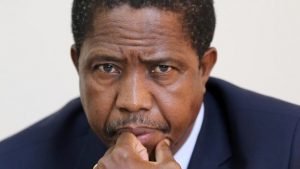
Lusaka — Zambia must build majority stakes in selected mines to benefit from its mineral wealth beyond taxes, President Edgar Lungu said on Thursday, as he set out an economic recovery plan after the country defaulted on a debt payment last month.
Africa’s second-biggest copper producer, Zambia is seeking to increase its control over the mining sector – the country’s main generator of hard currency – as it navigates a debt crisis.
“Owning a stake in some strategic mines gives the state the leverage required to utilise the defined mineral resources to benefit the nation,” Lungu said.
“I must mention that this is not nationalisation of the mines, on the contrary, it is the state acquiring majority stakes in selected mines while allowing private investors to also participate in the sector,” he added.
Lungu did not identify which mines the state would target for majority ownership.
Lungu’s economic recovery plan set out targets for the coming years. Zambia will aim for a real economic growth of more than 3% by 2022. It also aims to cut the fiscal deficit to 9% of gross domestic product (GDP) in 2021, 6.1% in 2022 and 4.9% in 2023.
The plan sees Zambia increasing international reserves to at least three months of import cover by 2023.
“Through value addition to our God-given natural resources we are going to sell products created thereafter to earn the much-needed foreign exchange,” Lungu said.
The southern African nation became the continent’s first pandemic-era sovereign default last month after it failed to pay a coupon on one of its dollar-denominated bonds.
Zambia had been wrestling with growing public debt even before the pandemic forced lockdowns around the world and hit demand for raw materials. Its debt-to-GDP ratio is nearly 140%.
As part of its move towards direct ownership of the mining sector, Zambia’s mining investment arm ZCCM-IH is in talks with Glencore to acquire its majority stake in Mopani Copper Mines, after the government butted heads with the Swiss-based company over a temporary shutdown of the mine due to COVID-19.
Glencore declined to comment on Lungu’s speech on Thursday.
Zambia has said it would buy gold directly from miners to bolster its foreign reserves after gold prices surged. The state must harness the potential of gold and encourage investment, Lungu said on Thursday.
The president promised a stable fiscal regime for the extractive sector to promote more investment in exploration, seeking to reassure investors who have been critical of the state’s expanding role in mining.
Mining companies with operations in Zambia apart from Glencore include First Quantum Minerals, Barrick , and Eurasian Resources Group.
Barrick declined to comment on Lungu’s announcement. First Quantum and ERG did not immediately reply to emailed requests for comment.
(Reporting by Chris Mfula, additional reporting by Helen Reid and Jeff Lewis; Writing by Olivia Kumwenda-Mtambo and Helen Reid; Editing by Elaine Hardcastle, Mark Potter and Edmund Blair)


